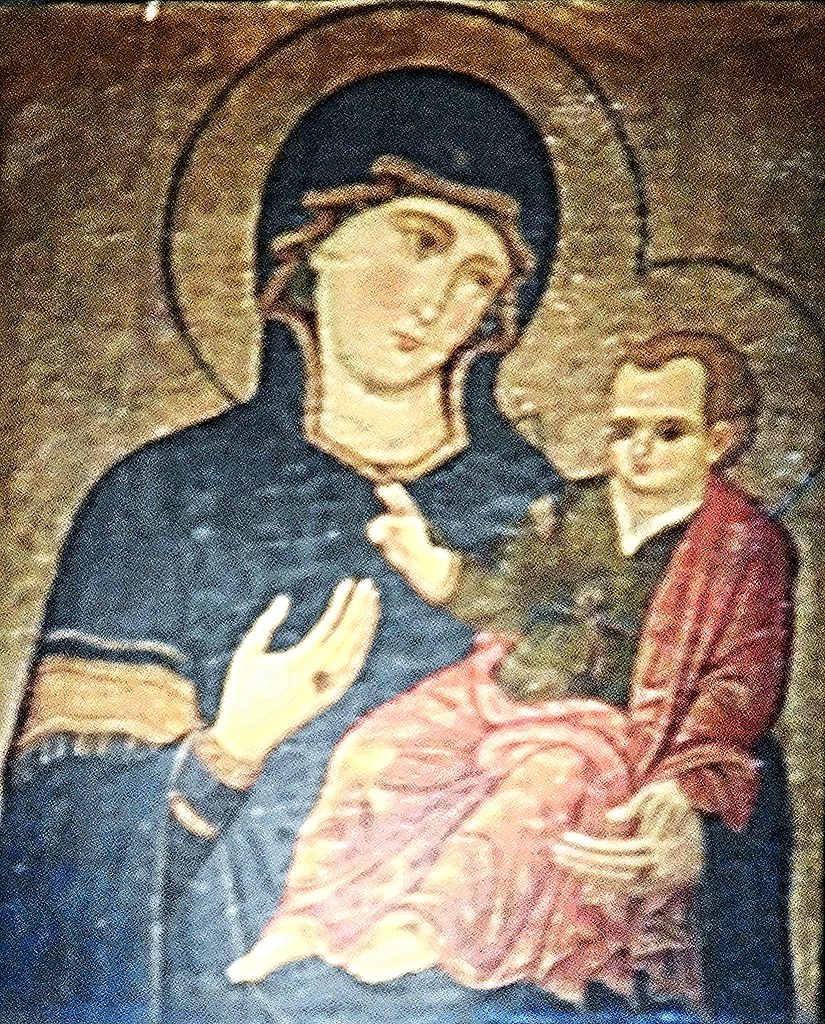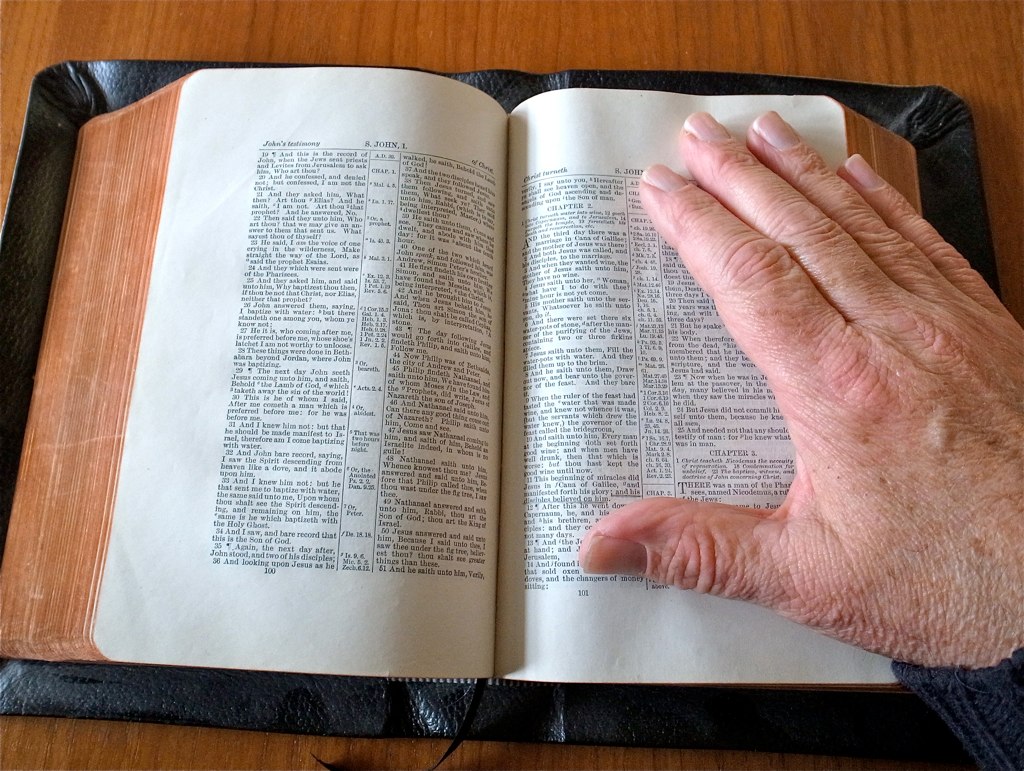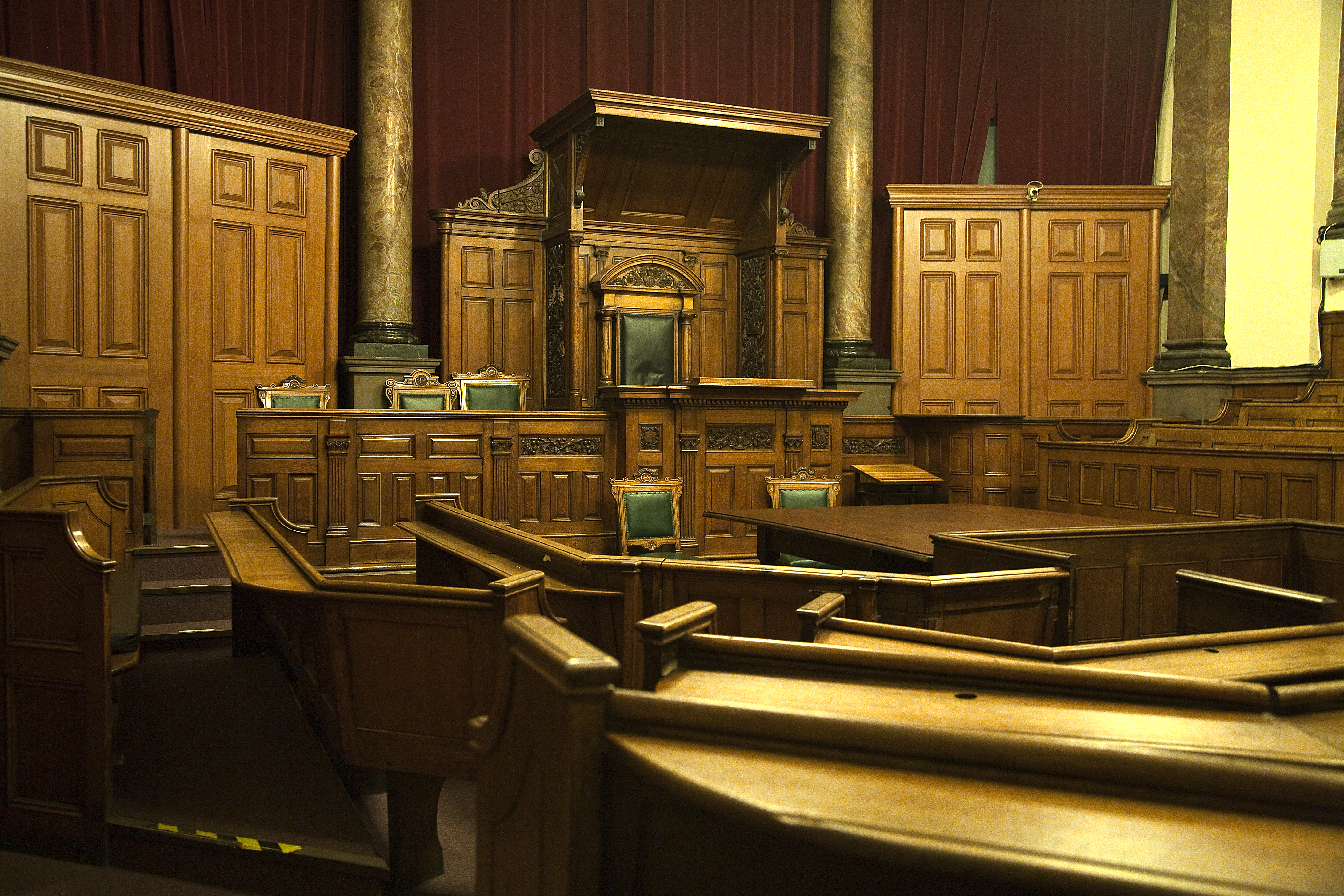Blog
M. W. Bassford
Kaitlin Hardy Shetler and the Basis of Authority
Friday, April 03, 2020
I think this was the only time in my life that I ever willingly clicked on a Facebook ad. It was from an organization called Authentic Theology, and the title was, “"Interview--Female Church of Christ Preacher, Poet Who Reached Millions, Kaitlin Hardy Shetler". Well done, adware! That’s the sort of link I’m going to click on!
Anyway, for those disinclined to read the article, the deal is that last December, Shetler posted a poem or short sermon about Mary breastfeeding Jesus that ended up critiquing churches that exclude women from the pulpit. Churches of Christ, that means you!
The poem/sermon attracted many thousands of shares. In another article, the writer for Authentic Theology notes that it attracted more attention on Facebook for 2019 than all (other?) writers from the churches of Christ put together. Apparently, even atheists found its message inspiring, which might be a tell of some sort.
The poem/sermon ain’t half bad, and though I did not find its message inspiring, I did find it fascinating. Abstracted out, the point of the poem/sermon is this: Mary’s unique experience should entitle her to preach, and men who have not had similar experiences should not silence the voices of those who have. In other words, personal experience is the source of authority and truth, and no one has the right to keep the one who has had the experience from preaching their truth.
No wonder the poem aroused such widespread enthusiasm (though not among members of churches of Christ)! That’s the postmodern credo in a nutshell. To the postmodernist, truth is not external and objective. It is internal and subjective. It doesn’t matter what my DNA says. If I feel like a man, that’s what I am (note that at the end of the interview, Shetler puts in her plea for acceptance of trans people too).
If we’re going to accept experience as the foundation of moral reasoning and the basis of moral conduct, then yes, Shetler is exactly right. There is no reason why my experience should be privileged above my sister’s experience, my wife’s experience, or anyone else’s experience. It’s an injustice to keep women out of the pulpit.
If. And therein lies the rub. I, along with everybody else who belongs to a church of Christ and has considered the matter at all, do not believe that truth is internal and subjective. Instead, I believe that it is external, objective, and epitomized in the word of God, which is inspired, infallible, and authoritative until the end of time.
Part of that truth is 1 Timothy 2:12. Despite the valiant efforts of folks like Craig Keener to prove otherwise, the text means what it says, and it says that women don’t get to exercise authority over men in a religious setting. Doesn’t much matter how I feel about it. If I want to please God, I need to do what He tells me to do.
It is interesting and telling that in her sermon/poem, Shetler doesn’t engage with this argument. Reasoning from a standard doesn’t resonate with her, any more than determining religious practice by studying the livers of sacrificial animals resonates with me. Instead, she describes the opposition as “ministers who say women are too delicate to lead.”
That makes for a nice rhetorical contrast (women face the burdens and indignities of childbirth and breastfeeding, but they are “too delicate” for the pulpit), but it doesn’t reflect the actual arguments made by me, anyone I know, or, I suspect, anyone Shetler knows. I don’t think she’s intentionally building a strawman, though. I think it’s the best experience-based argument against women in the pulpit that she can come up with. If we’re playing rhetorical ball on her ball field, that’s the scrub that comes trotting out for the away team.
Of course, the decision to emphasize experience over revelation is fraught with consequences. Toward the end of the interview, Shetler expresses the hope that in the churches of Christ of the future, women will be church leaders as fully as men, preaching, teaching, and everything else.
What she does not see is that such a decision would kill the churches of Christ, and indeed the entire Restoration Movement. We’re the people who do Bible. We’re the people who follow the pattern. Once we start ignoring one part of the pattern, there’s no point in holding to any of it. Once our experiences rather than the Bible become our guide, those experiences, which are common to the world, will make us indistinguishable from it.
Maybe the churches of Christ in the United States are doomed. I don’t know the answer to that. Only God does. This I do know, though: If we fail because we held fast to the word until the end, God will be honored by that.
If we fail because we exchanged the word for the world, He will not be.
Training Our Kids During Isolation
Tuesday, March 31, 2020
In every congregation I’ve ever been a part of, the message has been the same. Children’s Bible classes, as wonderful as they are, are not supposed to be anything more than a supplement to parents fulfilling their Ephesians 6:4 duty to bring up their children in the training and instruction of the Lord. How widely parents in any of those congregations have combined in-building training with at-home training, I have no idea.
Regardless of what Christian parents have been doing beforehand, things just got real in the teach-your-children department. If you’ve been bringing your kids to Bible class, they’ve been getting 90 minutes of instruction every week. If those Bible classes have been cancelled because of coronavirus, though, all of a sudden, their weekly Bible instruction has dropped by 90 minutes. Maybe it’s dropped to zero.
If, as I suspect will happen, restrictions on social gatherings are kept in place for the next couple of months, that’s a significant problem. Without in-home replacement, your kid is going to come back to Bible class thinking that Saul of Tarsus hosts a Minecraft channel on YouTube. Even those of us who have been doing teaching at home will need to step up our game.
The solution to the problem is not, I think, to invent a whole Bible-class curriculum for our children from scratch (though if you want to do that, it’s certainly fine). Instead, there are a number of alternatives that will help us bridge the gap without quite so much effort.
The first is to use daily Bible readings as a springboard for daily spiritual discussion. At Jackson Heights, Clay designed the Bible-reading program we’re using this year specifically with children in mind. The readings are all from the gospels, which means that many of them are story-based, and they’re generally short enough that even an early-stage reader can navigate them with help (particularly in a kid-friendly translation like the New International Reader’s Version).
Work through the day’s reading with your kids, and then spend 10-15 minutes talking about you’ve read. You don’t have to offer deep, compelling exegesis. Just make sure they have gotten the point and understand some applications.
There are, of course, plenty of other great reading resources for children out there. I know that in his Bible-reading posts, Edwin Crozier always includes a note for children. Those would be a great starting place too. I’m sure there are many other places to turn that I simply don’t know about.
Similarly, parents should take advantage of all the livestreamed-and-recorded sermons on YouTube and church websites. Jackson Heights has years’ worth of worship services on its YouTube channel, and the same is true for many other congregations. Just pick a sermon and listen to it with your children. If you can tell that they’re struggling to understand something, stop the video and talk through it with them.
Basically, whatever you might imagine would be useful for teaching your children during this time, there’s probably somebody online who has provided it. You can find curricula; you can find worksheets; you can find all sorts of things. The key is to look and be diligent, and to remember that God has entrusted your children not to the church, but to you. If you live up to your responsibility, your children will be benefited, and He will be pleased.
John and Witnesses
Monday, March 30, 2020
Most Christians probably appreciate the significance of Habakkuk 2:4 (“The righteous one will live by his faith.”) to understanding the New Testament, but the significance of Deuteronomy 19:15 often escapes us. It reads, “One witness cannot establish any iniquity or sin against a person, whatever that person has done. A fact must be established by the testimony of two or three witnesses.” In other words, before you accept something, you need to have multiple pieces of evidence that support it.
We see this principle at work in many, if not most, of the books of the New Testament. In Matthew and Mark, the legal case against Jesus falls apart because the Sanhedrin can’t find witnesses to agree on a single crime that Jesus has committed. In Acts, the tripartite structure of the first gospel sermon in Acts 2 is based on Deuteronomy 19:15. In 2 Corinthians 13, Paul describes his multiple visits to the Corinthian church as multiple witnesses. In 1 Timothy 5, we learn that we should not accept a charge against an elder except on the testimony of two or three witnesses. And so on. Indeed, the more we look for multiple witnesses at work in the Scriptures, the more we will find them.
However, in no book of the Bible is Deuteronomy 19:15 more important than in the gospel of John. Some commentators have compared John to a cosmic trial, a proceeding meant to prove that Jesus is the Son of God. Naturally, in such a trial, witnesses are very significant. In John 8:13-18, the Pharisees insist that they can ignore Jesus’ words because He is only bearing witness about Himself. Jesus retorts that even though His word alone is sufficient, the Father also bears witness to Him.
Indeed, this confirmatory structure is repeated throughout the entire gospel. Jesus will make a claim about Himself (“I am the light of the world”) and establish the truth of His claim with a relevant miracle (healing the man born blind). Sometimes, the order is reversed, as in John 6, when Jesus first feeds the 5000, then announces that He is the bread of life.
The fullest elaboration of this idea, though, appears in John 5:31-47. There, Jesus acknowledges that legally, His testimony by itself is insufficient. However, there are three other witnesses who confirm Him: John the Baptist, the Father, and the Scriptures. Thus, the Jews’ failure to accept Him is inexcusable and reveals their rotten hearts.
Even though we are 2000 years removed from the religious disputes of Jesus’ ministry, this methodology remains extremely important for us. Anybody can say that He is the Son of God. Lunatics do all the time. However, Jesus didn’t merely say. He backed it up by working miracles that His enemies tried to discredit (“He casts out demons by the power of Beelzebul prince of demons!”) but could not deny. John the Baptist, who could have been a competitor, acknowledged His deity. Prophecies written hundreds of years before His coming describe His ministry and death in such specific terms that they confirm His divine origin as well as their own. When we put it all together, we too can have confidence that Jesus truly was—and is—the Son of God.
The Parable of the Rich Hoarder
Wednesday, March 25, 2020
One of the marks of the coronavirus crisis so far has been the sudden scarcity of a number of strange items. The empty toilet-paper shelves at grocery stores will, I think, become one of the enduring images of 2020. For myself, I decided a week or two ago that I needed some 00 buckshot in my life, but I discovered that there were no boxes of 00 buckshot to be had anywhere, either in town or online.
We’re in the middle of a coronavirus epidemic, not a dysentery epidemic, so there is no particular reason why people’s toilet-paper needs should have spiked. Instead, the only thing that has spiked is anxiety. Somebody, somewhere, decided that they needed to buy a year’s worth of toilet paper to prepare for the coronavirus, somebody else saw them doing it, got scared, and decided to do the same thing, and now just about anybody who goes to the grocery store will at least feel the temptation to buy an extra pack “just in case”. As a result, some have houses full of toilet paper while others are reduced to plaintive appeals on Facebook.
As I considered this bizarre phenomenon, I could not help but be reminded of the parable of the rich fool in Luke 12:13-21. Jesus relates this parable as a warning against every kind of greed, but the particular kind of greed we see on display is hoarding. The rich fool has been blessed by God, but he is utterly uninterested in sharing his blessings with others. In today’s parlance, he decides to tear down his toilet-paper barns and build bigger ones. However, his death reveals the poverty of his selfishness.
Today, we can reveal our own selfishness not only in the way we heap up wealth and possessions but also in the way we accumulate further possessions at others’ expense. In a time of abundance, there’s nothing wrong with putting aside something extra to prepare for an uncertain future. The prepper who buys an extra bag of rice or beans every time he goes to the store has harmed no one, so long as the shelves still are filled with rice and beans. He’s motivated not by selfishness and fear, but by wisdom.
However, hoarding in a time of scarcity is another matter. One of the sisters at church has a co-worker who recently was desperately searching for potatoes. This co-worker’s means are modest, and she relies on potatoes and other inexpensive foodstuffs to feed her family.
However, when she got to the grocery store, there wasn’t a potato in sight. Panicked people had bought up all the rice, beans, and potatoes, leaving her with options she couldn’t afford. Thankfully, generous people quickly stepped up to help her, but it’s not hard to imagine a scenario in which sacks of potatoes rot on a hoarder’s pantry floor while others go hungry.
The spiritual problems with this behavior are serious. To begin with, it’s a clear violation of the second commandment. You don’t love your neighbor if you’re hoarding the food they need to survive.
Additionally, it shows a lack of faith. Though the Bible encourages us to be prudent and wise, we are not to rely on our own prudence and wisdom. We are to rely on God. When we are so concerned about protecting ourselves that we harm others in the process, our behavior proclaims our lack of trust in Him.
This is a dark time. As Christians, we are called to be lights in it. We should strive to be known for our concern and generosity toward others. By contrast, when our fear drives us to hoarding, our light becomes hidden beneath the heaps of goods we have amassed. If this is where God finds us when He calls our souls to Him, the truth of our poverty will be eternally exposed.
God, Our Stronghold
Tuesday, March 24, 2020
Never in my lifetime have I seen an event have as significant effect on daily life as the coronavirus epidemic. I remember the fall of the Berlin Wall and 9-11, but in both cases, it was business as usual almost everywhere. Not so with the coronavirus! Indeed, it even has affected our worship here.
I don’t know how most feel about this, but I myself find it profoundly unsettling. Lots of things that I thought would go on unchanged suddenly have changed. Dealing with a crisis like this is outside the experience of even our oldest and wisest elders. The future is uncertain and may be bleak.
However, despite the uncertainties of life, one thing does remain certain. Stores may have closed, schools may have shut down, but God is still God. Indeed, He is still the same God He was thousands of years ago, a God who protected His people from every calamity and disaster so long as they trusted in Him. This morning, then, I would like to go through Psalm 46 to see what we can learn from its depiction of God as our stronghold.
The first thing that we see here is the importance of TRUSTING GOD NO MATTER WHAT. Look at Psalm 46:1-3. I have to say, I really love the CSB rendering of v. 1 here. It tells us that God is a helper who is always found in times of trouble. Not part of the time. Not even most of the time. All the time. When things are worst, that’s when God is closest!
Because that is true, we as His people don’t have to be afraid. People in the world, sure. Frankly, they should be afraid. They’ve put all their hopes in this life, all that they worked so hard for is being disrupted, and even life itself may end much sooner than they were expecting. If I were in that position, I would be terrified!
However, we have not put our hope in this life. We have put our hope in God, and that is very different. We know that as long as we draw near to Him, He will draw near to us. He will be with us through every day of our lives, and He will continue to be our strength and our protector even after our lives are over.
This doesn’t mean that we should abuse His protection by being heedless and foolish. God expects us to be wise, plan for the future, and take precautions. However, we do not rely on those precautions. We rely on God, and He will not disappoint us.
God will protect us, and that is true without exception. In vs. 2-3 here, the psalmist is envisioning essentially the destruction of the physical creation. As God once separated the land from the waters, the psalmist is imagining the earth collapsing back into the waters, so that everything becomes formless and empty again. Even then, says the psalmist, God’s people don’t have to be afraid. It is still true today that no matter how bad things get, we can continue to trust God.
The second portion of Psalm 46 concerns GOD’S HELP FOR HIS CITY. Let’s continue in Psalm 46:4-7. This is about the city of Jerusalem. The psalmist expresses his conviction that she will never be toppled. Why? Because she is the dwelling place of the Most High. She might endure some long, dark nights, but when morning comes, God’s help will come with it.
Today, of course, God’s promises do not apply to the earthly city of Jerusalem. Instead, He is concerned with the Jerusalem above, which is His church. As we sing, the kingdoms of earth pass away one by one, but the kingdom of heaven remains. The kingdom of Christ is an everlasting kingdom that will not be destroyed.
As a result, we can be confident that God will continue to support and sustain His church through this time too. I don’t think that’s a confidence that we can place in any merely human institution. I don’t know how, but I suspect that the coronavirus is going to change our society in some significant ways. Things are going to be very different a year from now than they are now.
However, the Lord’s church is one of the things that will not change. I fear that a number of businesses will fail in the coming economic downturn, but that won’t happen to our congregation. In fact, I think that the months and years ahead will offer many opportunities for the church to grow. There are an awful lot of people out there who have been trusting in other things and now are in the process of realizing how foolish that is. We always need God, but that fact is more obvious when nothing else is working.
Finally, look at how powerfully God will exert Himself to protect His city. All of the things that the psalmist said earlier were the worst that could happen, those are the things that God will do to protect His people from their enemies. Franklin Delano Roosevelt famously said that the only thing we have to fear is fear itself. I don’t think that’s true. The only thing we have to fear is abandoning God. He will take care of everything else for us.
The psalm concludes by urging us to KNOW THAT HE IS GOD. Consider Psalm 46:8-11. Here, we finally see what problem the psalmist is concerned about. At this point in time, God’s people are facing an enemy invasion. However, he predicts that God will defeat the invasion so thoroughly that His people’s enemies will lose even the ability to invade. His victory will proclaim His deity and glory.
Today, we need to consider the works of the Lord. Death is currently ravaging our nation, but that is only happening because God has given death permission to do so. Even the great enemy of God is ultimately doing His will. Illness makes us suffer, but it also reminds us of how powerless we are.
I think that most people in our country feel entitled to live to a ripe old age and even beyond. However, our apparent control over aging and death is only illusory. None of us can do anything to add so much as a cubit to our lifespan. The force that God unleashed in Genesis 3 is as much beyond our power to control as the earthquake or the hurricane.
From this, we must learn that God is God. He is not like us. We cannot attribute our understanding or our limitations to Him. He is vastly beyond us, vastly greater than we are.
If we are not numbered with His faithful, that thought should be terrifying. There is this devastating force out there that surely will destroy us eventually. However, if we belong to Him, it should be incredibly reassuring. His word will shake everything else, ultimately bringing this physical creation to an end, but His kingdom and His people will not be shaken. Truly, He is our stronghold, the only defender we will ever need or could ever hope to have!


